 Petzlover
Petzlover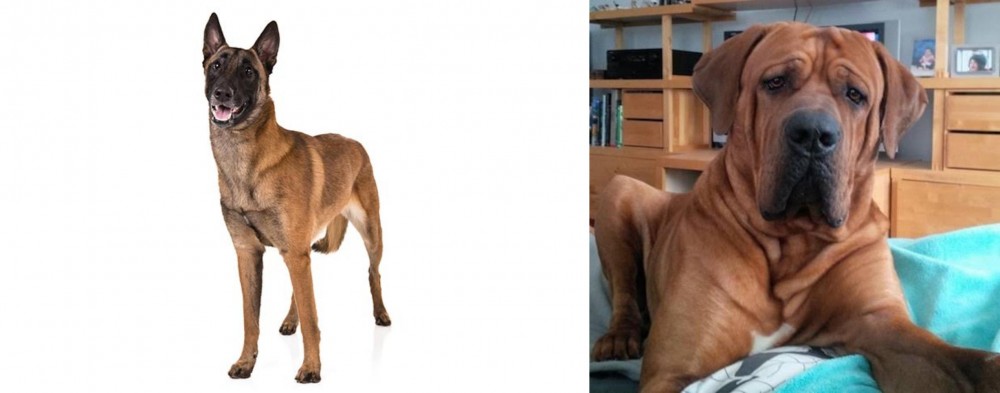 Belgian Shepherd Dog (Malinois) is originated from Belgium but Tosa is originated from Japan. Belgian Shepherd Dog (Malinois) may grow 16 cm / 6 inches shorter than Tosa. Belgian Shepherd Dog (Malinois) may weigh 56 kg / 123 pounds lesser than Tosa. Both Belgian Shepherd Dog (Malinois) and Tosa has almost same life span. Both Belgian Shepherd Dog (Malinois) and Tosa has almost same litter size. Both Belgian Shepherd Dog (Malinois) and Tosa requires Low Maintenance.
Belgian Shepherd Dog (Malinois) is originated from Belgium but Tosa is originated from Japan. Belgian Shepherd Dog (Malinois) may grow 16 cm / 6 inches shorter than Tosa. Belgian Shepherd Dog (Malinois) may weigh 56 kg / 123 pounds lesser than Tosa. Both Belgian Shepherd Dog (Malinois) and Tosa has almost same life span. Both Belgian Shepherd Dog (Malinois) and Tosa has almost same litter size. Both Belgian Shepherd Dog (Malinois) and Tosa requires Low Maintenance.
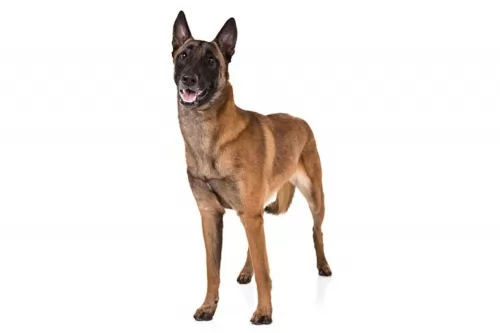 The Belgian Malinois is one of 4 Belgian Shepherd varieties. The dogs were developed- and hail from Belguim. The Malinois has a short, fawn colored coat. The American Kennel Club recognizes that the Malinois is a separate breed from the other 3 varieties. It was in 1892 that Professor Reul wrote the first Belgian Shepherd Dog standard, recognizing 3 varieties – dogs with short coats, dogs with long coats and dogs with rough coats.
The Belgian Malinois is one of 4 Belgian Shepherd varieties. The dogs were developed- and hail from Belguim. The Malinois has a short, fawn colored coat. The American Kennel Club recognizes that the Malinois is a separate breed from the other 3 varieties. It was in 1892 that Professor Reul wrote the first Belgian Shepherd Dog standard, recognizing 3 varieties – dogs with short coats, dogs with long coats and dogs with rough coats.
Today's Malinois goes back to a breeding pair owned by Adrien Janssens. It was in 1885 that he bought a fawn, rough-haired dog, breeding the dog with a short-haired dog named Lise de Laeken. After other breedings, the two dogs were recognized as ancestors of the modern Belgian Shepherd Dogs.
The city of Malines formed a club for the promotion of these fawn short hairs and the name Malinois became synonymous with them. In March 1992, the American Belgian Malinois Club received AKC parent club status.
 Known also as the Japanese Mastiff, the Tosa hails from Japan. In fact, these dogs come from the Tosa Province, so the dog was named after the region where they were bred.
Known also as the Japanese Mastiff, the Tosa hails from Japan. In fact, these dogs come from the Tosa Province, so the dog was named after the region where they were bred.
It is why they are sometimes referred to as Japanese Mastiffs. The Tosa is a rare dog breed and unfortunately, the dog is still used in Japan for dogfighting.
The breed was developed in the 2nd half of the 19th century, with a number of dog breeds being involved to bring about a more powerful, braver dog.
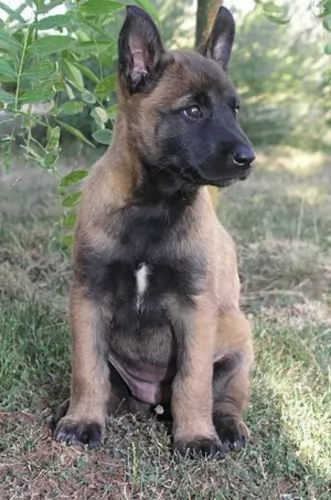 The Malinois is a medium-size Belgian shepherd dog. People sometimes mistake them for the German Shepherd as they are fairly similar to look at. The Malinois however is a smaller, lighter boned dog with naturally upright ears and a black-masked face. He is shorthaired and fawn-colored with black tips on the hairs, although other colors are brown or red too. He is an intelligent and active dog, always having been used for herding-, police- and rescue work.
The Malinois is a medium-size Belgian shepherd dog. People sometimes mistake them for the German Shepherd as they are fairly similar to look at. The Malinois however is a smaller, lighter boned dog with naturally upright ears and a black-masked face. He is shorthaired and fawn-colored with black tips on the hairs, although other colors are brown or red too. He is an intelligent and active dog, always having been used for herding-, police- and rescue work.
You’ll find the Malinois somewhat unpredictable as some are friendly and confident while other can be shy and withdrawn around strangers. This is a dog who loves to be around his human family, but to bring out the best in him, training and socialization classes will be necessary. Well-socialized Malinois are always good with children and other pets, more so if they’ve been raised with them.
 The Tosa is a large dog, but their sizes vary, and in fact, because of their fighting, they are actually divided into light-, middleweight and heavyweight classes.
The Tosa is a large dog, but their sizes vary, and in fact, because of their fighting, they are actually divided into light-, middleweight and heavyweight classes.
Generally, you can say that these dogs weigh in the region of 54 to 90kg and they stand in height at between 62 to 82cm. The head is large, the jaws powerful, the eyes dark brown in color, the ears small, high set and floppy.
The neck is broad wit a dewlap and the tail is long, thick and tapering to a point. The coat is short and thick and is most times a rich caramel color, fawn tan, black or brindle. The dog often has a black mask.
The Tosa is a fairly quiet dog, courageous and fearless. He is going to need a strong, consistent owner who shows leadership with him. Training and socialization will be imperative for this dog.
When he has been properly reared and trained, he makes a good pet, able to get on with members of the family. He takes his role as protector and guardian seriously.
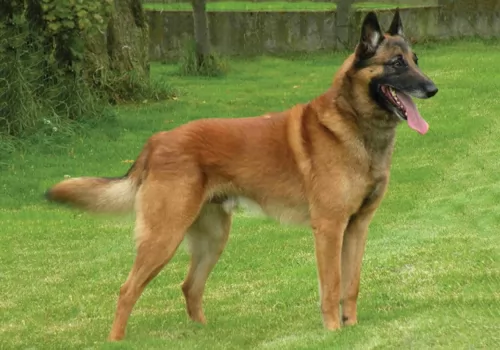 The Belgian Malinois makes a wonderful guard dog and he works hard to ensure that his human family, whom he adores, are well protected under his watch. They’re such intelligent dogs too that you may feel inclined to pass over some of your chores to him.
The Belgian Malinois makes a wonderful guard dog and he works hard to ensure that his human family, whom he adores, are well protected under his watch. They’re such intelligent dogs too that you may feel inclined to pass over some of your chores to him.
He responds well to training, and to get the best from this breed, start with training and socialization as soon as you bring your puppy home.
Socialization is excellent as it introduces your puppy to different people, animals as well as situations.
He is an adaptable dog and can live in an apartment if he is well exercised. He can be your devoted and loyal friend for a good number of years but you will have to do your part in providing him with the best care possible.
 The Tosa isn’t recommended for first-time dog owners, as in the wrong hands, they can become aggressive. Care has to be taken around children too especially undisciplined ones.
The Tosa isn’t recommended for first-time dog owners, as in the wrong hands, they can become aggressive. Care has to be taken around children too especially undisciplined ones.
He also doesn't come as recommended for small, cramped homes in the city. He’s just too big and he will need to get out and be walked often.
You want to create a home for him that ensures he is the calm, gentle dog he is capable of being, If you’re fair, firm, caring, patient and consistent, then this big dog might be for you. With the right care he becomes a gentle, devoted pet.
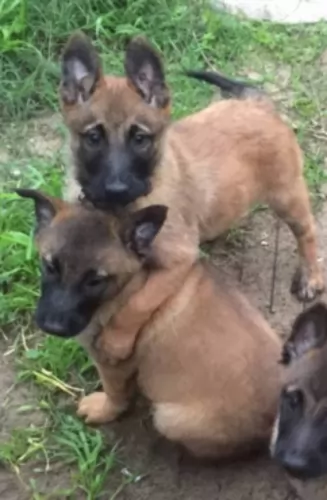 Belgian Malinois are generally healthy dogs. However every dog, regardless of breed, can pick up illnesses, and it is always wise to be aware of some of the diseases your Malinois might face.
Belgian Malinois are generally healthy dogs. However every dog, regardless of breed, can pick up illnesses, and it is always wise to be aware of some of the diseases your Malinois might face.
An inherited condition where the thigh bone doesn't fit properly into the hip joint. As the dog ages, arthritis can develop.
A degenerative eye disorder that can lead to blindness.
Brush his teeth at least 2 or 3 times a week to remove tartar build-up. Too much plague leads to inflamed gums, bad breath, pus inside the mouth and even loss of teeth.
 The Tosa is a formidable looking molossoid, but even so, this big, calm dog can succumb to illness. Some of these diseases you need to be looking out for include bloat,hip dyslasia and eye conditions.
The Tosa is a formidable looking molossoid, but even so, this big, calm dog can succumb to illness. Some of these diseases you need to be looking out for include bloat,hip dyslasia and eye conditions.
Bloat for this dog can be life-threatening, and can often be because the dog is too hungry and he gobbles up his food quickly. Bloat is when gas can't escape, the stomach swells and twists – very dangerous. Rather give your dog two smaller meals – one in the morning and one in the evening, or even give several smaller portions throughout the day.
To help with eliminating health issues always choose a reputable Tosa breeder. You’re not likely to find one of these dogs in a dog shelter.
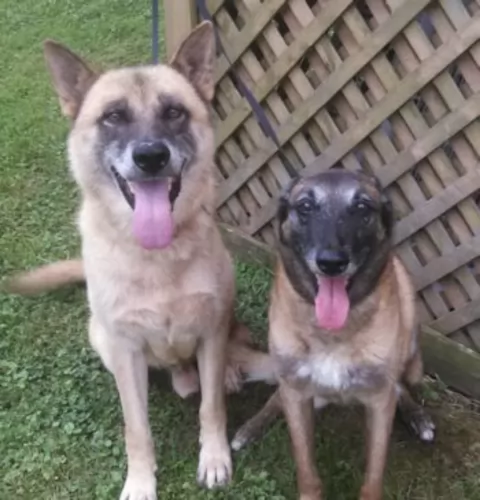 Because the Malinois is a constant shedder, with a couple of heavy shedding periods during the year, you’ll need to be conscientious with his grooming and brush him at least twice a week to get rid of loose hairs and to give his thick coat a glossy, healthy look to it.
Because the Malinois is a constant shedder, with a couple of heavy shedding periods during the year, you’ll need to be conscientious with his grooming and brush him at least twice a week to get rid of loose hairs and to give his thick coat a glossy, healthy look to it.
Because of their high energy, Malinois aren’t recommended for couch-potato type owners. It will be cruel to buy such a dog and to leave him to waste away with boredom and frustration in your back yard. He’ll want lots of rough and tumble, ball games, runs in the park or in the country and long walks.
Belgian Shepherd Malinois puppies are vulnerable when they’re tiny, and it would be wise to speak to your vet about superb nutrition to build up a puppy’s immune system.
An excellent way to ensure the health of your growing Malinois is to give him a home prepared meals along with commercially manufactured food recommended by your vet. You can’t just put a bowl of commercially manufactured dog food in front of him day after day month after month.
Apart from what your vet recommends, give him some brown rice, some cooked vegetables and some raw meat. Raw meat will ensure he can fight of skin infections. The age of the dog, emotional state and environmental influences can all play a role in skin diseases with dogs, but by ensuring some raw meat in his diet, the immune system is strengthened and skin disorders are eliminated. Always ensure a steady supply of fresh water.
 These large, strong dogs do well on good quality food. If you opt to buy him commercially manufactured food, make sure it is the top quality one free of unwholesome ingredients such as preservatives, colorants and useless fillers.
These large, strong dogs do well on good quality food. If you opt to buy him commercially manufactured food, make sure it is the top quality one free of unwholesome ingredients such as preservatives, colorants and useless fillers.
Invest in the best quality ones that have nutritious minerals and vitamins. Try and give your dog some home-prepared food too – boiled chicken, brown rice or pasta, spinach, sweet-potatoes and carrots.
Never feed your dog things such as chocolates, peanuts, crisps, grapes, onion and food with spicy flavorings. This will just ensure digestive problems and having to get your dog to the vet.
The Tosa’s short coat isn’t going to require too much attention. A good brush twice a week will keep it free from loose hair and keep its shine and gleam. It’s why the dog is looked upon as being low maintenance.
Beyond that, he will need to have his nails trimmed. When brushing him, check him over for parasites – ticks and fleas, check for unusual lumps and look inside his ears for signs of redness.
These dogs are calm and fairly low-energy. Nonetheless, to maintain good health, he will need to be exercised. Ball games outside are always a good idea as well as nice long walks. Hikes into the countryside will be wonderful for this big dog.